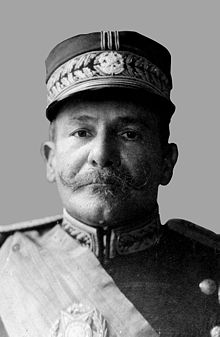- Hermes da Fonseca
-
Hermes Rodrigues da Fonseca 
8th President of Brazil In office
November 15, 1910 – November 15, 1914Vice President Venceslau Brás Preceded by Nilo Peçanha Succeeded by Venceslau Brás Personal details Born May 12, 1855
São Gabriel, Rio Grande do Sul, BrazilDied September 9, 1923 (aged 68)
Petrópolis, Rio de Janeiro, BrazilNationality Brazilian Political party None Hermes Rodrigues da Fonseca (Portuguese pronunciation: [ˈɛɾmis roˈdriɡis da fõˈsekɐ]; May 12, 1855 – September 9, 1923) was a Brazilian soldier and politician. The nephew of Deodoro da Fonseca, the first Brazilian President, he was the country's Minister of War in 1906. In 1910, he was elected as the 8th president of Brazil, serving until 1914.
He was on an official visit to Portugal when the revolution that overthrew the Portuguese monarchy and replaced it with a new republican regime took place.
Contents
Biography
His father was from Alagoas and served in the Brazilian armed forces; as part of his service, he was transferred to São Gabriel. Hermes was born in there in 1855. When his father was sent to the War of the Triple Alliance, the family returned to Rio de Janeiro.
Military career
In 1871, at 16, he got his bachelor's degree in Science and Letters and enrolled in the Military Academy, where he was student of Benjamin Constant, a promoter of the ideas of Auguste Comte in Brazil. When he graduated, he served as aide-de-camp to Gaston, comte d'Eu.
He was a supporter of the republic proclaimed by his uncle Deodoro da Fonseca and was invited by the latter to be camp assistant and military secretary after the coup. During the Revolta da Armada (1893) he proved his worth in the command of the defense of Floriano Peixoto's government. He headed the Police Brigade of Rio de Janeiro from 1899 to 1904, when he assumed command of the Military Academy of Realengo.
As commander of the Academy he fought against the Vaccine Revolt. He was promoted to Marshal. He performed various jobs until becoming Minister of War during Campos Sales.
He continued in that position during the next president, Afonso Pena, and reformed the army and the ministry with the creation of technical and administrative services. Of these innovations, the most important was the institution of obligatory military service. He resigned due to the discussion in Congress about the participation of soldiers in politics of Brazil. He was later a minister of the Supreme Federal Court (Brazil)
1910 Elections
In November 1908, he was pointed to for the succession. Counting with the support of Nilo Peçanha and all states other than São Paulo and Bahia.
For the first time in republican history, there was an actual campaign with the "civilista" campaign running in open election against Hermes da Fonseca.
Once elected, he traveled to Europe, where he was witness to the fall of monarchy in Portugal.
Presidency
Among the events of his presidency were the Chibata Revolt and the Contestado War. Renegotiation of Brazil's National debt meant a second funding loan was set up.
Post 1914
After leaving the presidency, in November 1914, he ran for the senate for Rio Grande do Sul, but refused to take the position because of the assassination of Pinheiro Machado in September 1915. He traveled to Europe, returning to Brazil after living in Switzerland for six years, when a new presidential campaign was underway.
He was welcomed by the military men and assumed the presidency of the Military Club in 1921. In this post, he was involved in the 18 of the Copacabana Fort revolt, which started at Fort Copacabana.
Preceded by
Nilo PeçanhaPresident of Brazil
1910–1914Succeeded by
Venceslau BrásSee also: List of Presidents of Brazil
Presidents of Brazil Old republic Deodoro da Fonseca · Floriano Peixoto · Prudente de Morais · Campos Sales · Rodrigues Alves · Afonso Pena · Nilo Peçanha · Hermes da Fonseca · Venceslau Brás · Delfim Moreira · Epitácio Pessoa · Artur Bernardes · Washington Luís · Júlio PrestesVargas era Republic of 46 Eurico Gaspar Dutra · Getúlio Vargas · Café Filho · Carlos Luz · Nereu Ramos · Juscelino Kubitschek · Jânio Quadros · Ranieri Mazzilli · João GoulartMilitary period Ranieri Mazzilli · Humberto Castello Branco · Artur da Costa e Silva · Military Junta · Emílio Médici · Ernesto Geisel · João FigueiredoNew republic Categories:- 1855 births
- 1923 deaths
- Marshals of Brazil
- People from Rio Grande do Sul
- Presidents of Brazil
Wikimedia Foundation. 2010.
